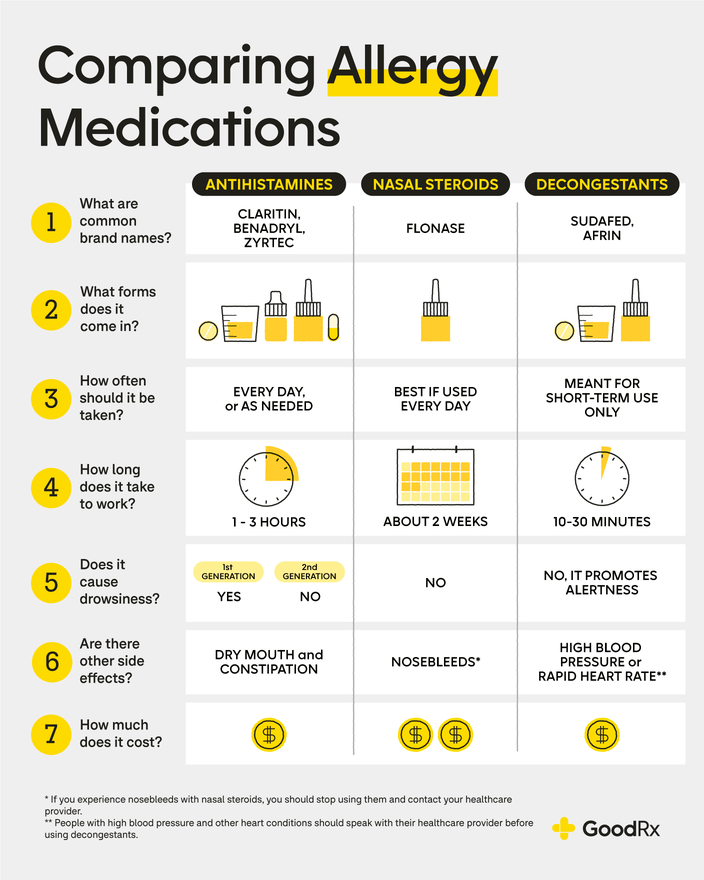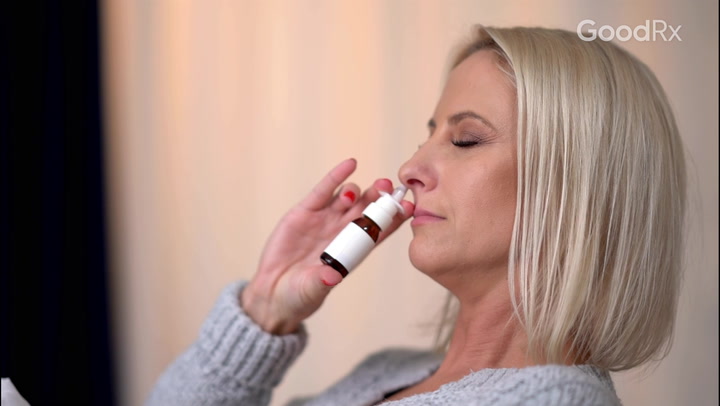
Zyrtec vs. Claritin vs. Allegra: Which Works Best for Allergies?
Key takeaways:
Zyrtec (cetirizine), Claritin (loratadine), and Allegra (fexofenadine) are over-the-counter (OTC) antihistamines used to treat allergies. Overall, they work similarly well, but you may find that one works better for you.
These three medications are all labeled as “nondrowsy antihistamines” because they cause less drowsiness than older antihistamines, such as Benadryl (diphenhydramine). However, Zyrtec is more likely to make you sleepy than Claritin or Allegra.
Other OTC allergy medications include nasal steroids, such as Flonase (fluticasone propionate), and decongestants, such as Sudafed (pseudoephedrine). Your prescriber or pharmacist can help you choose the best treatment for your allergies.
Access savings on related medications
Table of contents

Allergies are common, with about 81 million people in the U.S. experiencing some type of allergy symptoms each year. If you have allergies, you know how bothersome these symptoms — a runny nose, itchy eyes, sneezing, and more — can be.
Fortunately, there are several over-the-counter (OTC) medications that can help. Zyrtec (cetirizine), Claritin (loratadine), and Allegra (fexofenadine) are examples of popular OTC antihistamines.
It can be hard deciding between Zyrtec, Claritin, and Allegra — or maybe something else altogether. You can start by finding out more about how they work, what side effects you can expect, and what the alternatives are.

Zyrtec vs. Claritin vs. Allegra: Which is the best allergy medicine?
In general, Zyrtec, Claritin, and Allegra are all similarly effective for treating allergies. But some studies suggest Allegra might work slightly better for eye-related symptoms. And Claritin may be slightly less effective than other similar antihistamines. But overall, experts don’t recommend one of these three antihistamines over the others.
Typically, many people find that one antihistamine works better for them or causes fewer side effects. But if you’re unsure which to try first, there are a few differences between them to consider. For example, Zyrtec tends to start working slightly faster than Claritin or Allegra, but it has a higher chance of causing drowsiness.
In general, antihistamines tend to be more effective when started before you are exposed to an allergen. And each of these medications can be taken daily if needed.
In the table below, we compare some specifics of Zyrtec, Claritin, and Allegra. This might give you some insight into which one may be best for you.
When it starts working | |||
How long it lasts | About 24 hours | Up to 24 hours (12-hour versions also available) | Up to 24 hours (12-hour versions also available) |
Drowsiness Sore throat Dizziness Dry mouth | Headache Dizziness Dry mouth Fatigue (rare) | Headache Indigestion Back pain Dry mouth | |
Situations that may require a dosage adjustment | Lower dose needed if you have liver or kidney problems | Lower dose needed if you have liver or kidney problems | Lower dose needed if you have kidney problems |
Cost for a 30-day supply (generic) | Lowest price with a GoodRx coupon: as low as $3.16 | Lowest price with a GoodRx coupon: as low as $5.95 | Lowest price with a GoodRx coupon: as low as $7.66 |
Keep in mind that these medications are available OTC. In order to use a GoodRx coupon, you’ll need a prescription for them.
Zyrtec vs. Claritin vs. Allegra: How do they work?
Zyrtec, Claritin, and Allegra belong to a class of medications called antihistamines. Antihistamines, as the name suggests, work against histamine. Histamine is a chemical in the body that is released when the immune system is fighting allergens, which causes allergy symptoms. Zyrtec, Claritin, and Allegra block histamine’s effects, which helps reduce allergy symptoms.
What kind of allergies do Zyrtec, Claritin, and Allegra treat?
Zyrtec, Claritin, and Allegra are most commonly taken to treat seasonal and year-round (perennial) allergies in people as young as 2 years old.
Comparing options: Learn about the differences between allergy medications so you can choose the right one for you.
When allergy medications stop working: Learn why your allergy medicine isn’t working and what you can do to get relief.
More than medication: Three people share the daily lifestyle changes that have helped reduce their allergy symptoms.
But, in general, antihistamines can also help with treating chronic hives, an allergic skin condition. Research suggests that several antihistamines — including Zyrtec, Claritin, and Allegra — were more effective than a placebo (a pill with no medication in it) at treating hives.
Good to know: Zyrtec, Claritin, and Allegra are not intended to treat life-threatening allergic reactions, such as anaphylaxis. These types of reactions are a medical emergency and require immediate care in a hospital setting.
How do the side effects of the medications differ?
Zyrtec, Claritin, and Allegra are all labeled as “nondrowsy antihistamines.” That’s because they’re less likely to cause drowsiness compared to older antihistamines, such as Benadryl (diphenhydramine). But they can still make some people drowsy. And, as mentioned above, Zyrtec is more likely to cause drowsiness than Claritin or Allegra.
Zyrtec, Claritin, and Allegra also carry a risk of other side effects. Since they are very similar medications, their side effects are more or less the same. Common ones include:
Fatigue
Dizziness
Nausea or indigestion
Rare but potentially serious risks and side effects include:
Allergic reactions (if you’re allergic to the medication)
Excessive sleepiness if combined with alcohol or other sedating medications, such as opioids or muscle relaxers
Trouble urinating, especially if you have problems with an enlarged prostate
Worsening of certain types of glaucoma
Are there better allergy treatments?

The short answer to whether or not there are better options out there is: It depends. Antihistamines — such as Zyrtec, Claritin, and Allegra — work quickly and can usually be taken safely long term.
Antihistamine nasal sprays are the closest alternative to oral antihistamines. Astepro (azelastine) is an example. These medications work for allergies in the same way as Zyrtec, Claritin, and Allegra. But they start working much faster — in as little as 15 minutes. And research suggests antihistamine nasal sprays work better than their oral counterparts.
Steroid nasal sprays are another alternative to Zyrtec, Claritin, and Allegra. Flonase (fluticasone propionate) and Nasacort (triamcinolone) are two examples. These nasal sprays can take longer to work than antihistamines (up to 2 weeks for full effects). But experts consider them to be one of the most effective types of preventative medication for long-lasting nasal allergies.
Allergy decongestants, such as Sudafed (pseudoephedrine) and Afrin (oxymetazoline) nasal spray, work by tightening the blood vessels around the nose. They have the benefit of working quickly (about 30 minutes or less). But they aren’t recommended as first-choice or long-term treatments.
Sudafed can cause bothersome side effects, such as increased blood pressure and a high heart rate. Because of this, you shouldn’t take Sudafed for longer than 7 days without a healthcare professional’s OK. And Afrin shouldn’t be used for more than 3 days in a row. Your body can quickly become dependent on this nasal spray. So there’s a risk of having more congestion (rebound congestion) with long-term use of Afrin.
The best allergy medication for you likely depends on your symptoms, how quickly you need relief, and how you could potentially be affected by a medication’s side effects. If you have questions about the different options, talk with your healthcare team, who can help you choose the best allergy treatment.
Good to know: You can safely combine all four classes of allergy medications if needed. This is a great strategy for quick relief while longer-acting medications, such as nasal steroids, start working. But you should speak with your prescriber or pharmacist before taking more than one medication at a time. They can help make sure you’re getting the most out of your allergy treatments while staying safe.
What about Zyrtec-D, Claritin-D, and Allegra-D?
What does it mean when you see a “-D” next to Zyrtec, Claritin, and Allegra? The “D” stands for decongestant, and it means that there’s an added decongestant. In this case, pseudoephedrine (Sudafed’s active ingredient) is included in these medications.
If your allergy symptoms include sinus congestion, it may be worth considering Zyrtec-D (cetirizine / pseudoephedrine), Claritin-D (loratadine / pseudoephedrine), or Allegra-D (fexofenadine / pseudoephedrine). But these combination products aren’t safe for everyone to take.
Who should not take Zyrtec-D, Claritin-D, or Allegra-D?
If you have high blood pressure or other heart conditions, you should avoid decongestants like Sudafed. You should also steer clear of medications that contain pseudoephedrine, such as Zyrtec-D, Claritin-D, and Allegra-D. As mentioned above, decongestants work by narrowing the blood vessels in your nose. But they also narrow blood vessels in other areas of the body, including the heart and blood vessels. This can raise your blood pressure and heart rate.
It’s also a good idea for people living with diabetes to avoid decongestants. These medications can raise blood glucose (blood sugar) levels for people with this condition.
Check with your prescriber if you’re unsure about whether or not you can safely take a medication containing a decongestant.
Frequently asked questions
No, Zyrtec doesn’t usually help with eczema. Research suggests that Zyrtec and other antihistamines pills don’t work well for reducing eczema symptoms.
Yes, Zyrtec can help reduce itching from insect bites. When a bug bites you, your body releases histamine. This is what causes that itchy feeling. Zyrtec blocks histamine’s effects, making it an option to help with itchy bug bites.
Most people don’t need to taper off Zyrtec. “Tapering off” means to slowly lower your dose over time, usually to help prevent withdrawal symptoms. Most people can stop Zyrtec whenever they want or need to.
But there are cases of people experiencing itching after trying to stop Zyrtec. If this happens to you, speak with a healthcare professional. They may suggest splitting your dose in half for a few weeks before trying to stop it. But keep in mind that there is no standard Zyrtec tapering schedule available.
The bottom line
Zyrtec (cetirizine), Claritin (loratadine), and Allegra (fexofenadine) are over-the-counter antihistamines that help relieve allergy symptoms. They’re all labeled as nondrowsy allergy medications. But Zyrtec can still cause drowsiness for some people who take it.
Zyrtec, Claritin, and Allegra work similarly well for managing allergy symptoms. All three start working within a few hours, but Zyrtec works a bit faster than Claritin and Allegra. You can also take them on a daily basis for longer periods of time to help prevent allergy symptoms.
Always check with your healthcare team before starting a new medication. They can help you decide which medication would be safest and most effective for you.
Why trust our experts?



References
Asthma and Allergy Foundation of America. (n.d.). Allergy facts.
Chung, A. H., et al. (2019). Pruritus after discontinuation of cetirizine. Therapeutics Advances in Drug Safety.
Cocker, K., et al. (2019). Oral H1 antihistamines as add-on therapy to topical treatment for eczema. American Family Physician.
Craun, K. L., et al. (2024). Fexofenadine. StatPearls.
Dykewicz, M. S., et al. (2020). Rhinitis 2020: A practice parameter update. The Journal of Allergy and Clinical Immunology.
Hong, D., et al. (2023). Efficacy of different oral H1 antihistamine treatments on allergic rhinitis: A systematic review and network meta-analysis of randomized controlled trials. Brazilian Journal of Otorhinolaryngology.
Linton, S., et al. (2023). Evidence-based use of antihistamines for treatment of allergic conditions. Annals of Allergy, Asthma, and Immunology.
MedlinePlus. (2017). Histamine: The stuff allergies are made of.
Naqvi, A., et al. (2024). Cetirizine. StatPearls.
Northern Sydney Local Health District. (2018). Deprescribing guide for sedating antihistamines.
PubChem. (2025). Pseudoephedrine. National Library of Medicine.
Seidman, M. D., et al. (2015). Clinical practice guideline: Allergic rhinitis. Otolaryngology–Head and Neck Surgery.
Sharma, M., et al. (2014). H1‐antihistamines for chronic spontaneous urticaria. Cochrane Database of Systematic Reviews.
Sidhu, G., et al. (2023). Loratadine. StatPearls.

























